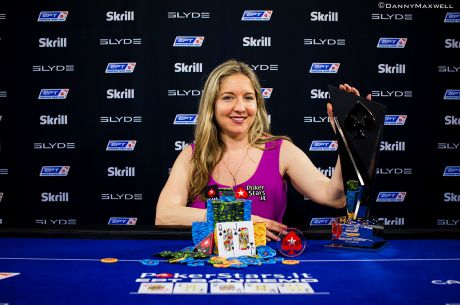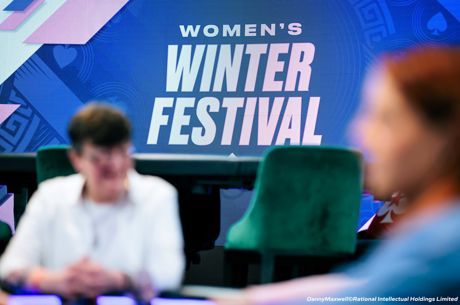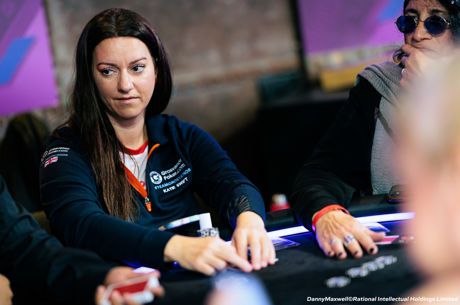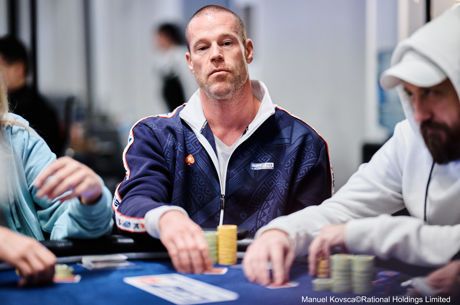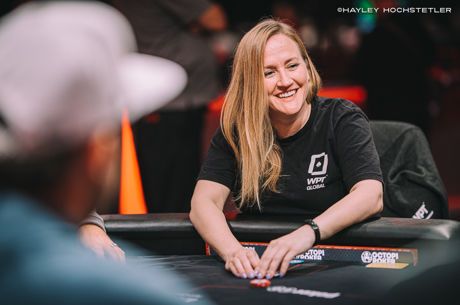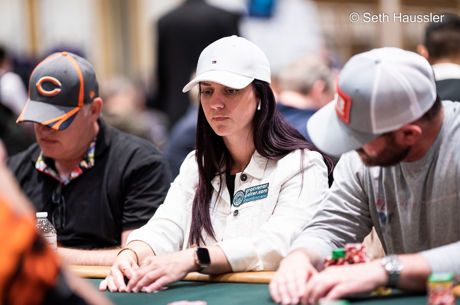The Unabridged Story of The Hendon Mob (Part Two: The Early Years )

Table Of Contents
When we last spoke to notorious poker group The Hendon Mob in Part 1, we heard about their formation in North London in the mid-1990s. The four of them were together as business partners, but at the table, they played harder than ever against each other.
A revolutionary new poker television show was about to put their collective and individual names up in lights, camera, and action. This is the story of The Hendon Mob’s early years.
A Traveling Poker Group
After becoming a foursome known as The Hendon Mob in the Grosvenor Victoria casino, blackjack-turned-poker player Joe Beevers, TV actor Ross Boatman, journalist Barny Boatman, and former snooker player Ram Vaswani hit the road.
“We were all very competitive,” says Vaswani, who enjoyed the best early results of the four. “I used to play a lot more than Ross and Barny at the start. Joe and I were playing private games every day. The four of us started traveling a lot together and to start with; I did have a few more results.”
Barny Boatman concedes that during those early days, Vaswani had the edge when it came to results.
"poker is an individual game. But it can be cut-throat and lonely. Having this family that you could go around with was great."
“Ram was my absolute doctor. He used to always get there against me. He knocked me out of more tournaments than everyone else put together!”
That included in the . The boys were playing for big money, and Vaswani and the eldest Boatman brother were both still involved with just three players left.
“I had Ram covered, and the other guy was short. I had a big hand, and Ram raised me all-in with a draw. I called him, and he hit it. He won the Master Classics, and I came third.”
“That’s just the way it was,” laughs Vaswani. “There were a couple of big tournaments where I knocked him out. If he’d knocked me out instead, he probably would have gone on to win it. That was the first big tournament I won, so it could have been completely different.”
It’s Boatman’s turn to laugh. The four men all admit they were very competitive at the table. Each one of them wanted the glory, but once the game was over, they were tight. A traveling poker group wasn’t common in those days; there weren’t Skype groups, WhatsApp threads, or high roller cliques. There were four men taking on the world, and supporting each other was a crucial part of it.
“People called us on it,” says Barny Boatman. “‘Are you a team?’ they’d ask. We weren’t - poker is an individual game. But it can be cut-throat and lonely. Having this family that you could go around with was great.”
That said, it’s clear that the others didn't mirror Vaswani's early success. As Boatman senior put it, “Ram was the one who was finishing off tournaments and getting results. He was, I’m sure, the most highly regarded, both outside the group and inside Ram’s head, with some grudging acceptance from the rest of us that he wasn’t too bad.”
Money Was Tight
During this period, the ‘Mon’ decided two things. First, they’d always swap 5% of their winnings, as a way of keeping some liquidity within the ‘family’ they’d set up. It was entirely functional as well as friendly too, thanks to the idea of the website.
"With the possible exception of Ram, the rest of us were struggling financially."
“From day one until it was sold, the website and the business side of us were always self-funded,” says Barny. “That's what kept it going, and Joe deserves a lot of credit for that. It’s one thing having the idea of the database, but another to do the graft. Joe and I were equal partners with different roles. I think we made a very good team.”
With a growing website featuring things like ‘Mobster of the Month’ where amateur players could send in their photos and results, the site grew with the foursome. But money was still tight for both the Boatman brothers.
“There was a period of time between setting up the site and having some success, and with the possible exception of Ram, the rest of us were struggling financially. I remember coming back from Paris on the Eurostar, and neither Ross or I managed to get into the big game. We vowed never to turn up again without money because it’s soul-destroying.”
From then on, the Mob would only play what they could afford to sit down in.
"None of it Might Have Happened if it Hadn’t Been for Victoria Coren"
They needed help, they needed exposure, and they had a friend who offered to assist. She was a friend of the group and an up-and-coming journalist by the name of Victoria Coren.
“None of it might have happened if it hadn’t been for Victoria Coren as she was then or Victoria Coren-Mitchell as she is now. She was very media-savvy and a good writer. And she was a good friend. She had an idea for a feature about us in the Evening Standard.”
That feature portrayed the four men as the future of poker - a poker ‘pop group.’ Years before Phil Hellmuth arrived to play the Main Event dressed up as Julius Caesar, the Mobsters were creating a buzz about them.
“We weren’t the world’s top poker players, but between us, we had a lot of chemistry and enthusiasm for the game,” says Boatman. “We knew how to talk about the game, and it was all genuine.”
In the article, the four men were given nicknames, with Ross' glamorous acting background ('The Glamour') and Barny's quick wit ('The Humour') behind the Boatman brothers' monickers. Vaswani’s nickname still makes all four men laugh, including the youngest of the group himself. Or rather, Ram ‘The Looks’ Vaswani.
“It was great for my ego, but I didn’t really want it to stick because I thought to myself, ‘How am I going to be walking around with that nickname when I’m 67 years old?!”
Beevers was the only man who liked his nickname and retained it over the coming years. “I was ‘The Elegance’ because I wore smart suits,” Beevers said.
“Those nicknames were all made up because we needed to have something quickly,” says Ross Boatman, who chuckles at ‘The Glamour,’ although that side of The Hendon Mob’s career was about to come. After many years of playing in casinos or private games, television finally woke up to the possibility of poker’s growing popularity leading to significant viewing figures. Ross Boatman saw the potential from the off.
Late Night Poker and Lipstick Cams
“We were invited to go on because we were faces on the poker scene. I’d won the British no-limit hold’em championship, and Barny was the seven-card stud champion. Joe was the Irish Omaha champion, and Ram was overall European champion,” Ross said.
You might assume that players were queueing up to be one of the forty players invited onto the show, but as Beevers explains, that wasn’t the case at all.
“We were playing the at the in Vienna and Thomas Kremser was the tournament director. One day, we were at the bar, and told us that he was making a TV show for poker and he was struggling to get players involved.”
"We were invited to go on Late Night Poker because we were faces on the poker scene."
The reason for players to refuse this golden opportunity was down to the revolutionary ‘lipstick’ cameras, which were placed under the table and would show the players’ hole cards through a glass pane that was built into the tables.
“A lot of pros were scoffing at the idea,” says Ross Boatman. “We saw beyond that, and the possibilities of sponsorship. And people laughed at that too!”
“They were saying ‘What, you have cameras under the table, and you put cards on glass and people can see the cards?’” says Beevers, talking about the dozens of players who turned the chance down.
“We said what’s the buy-in, he said ‘$1,500.’ There were forty players. Logos and sponsorship were completely unheard of, but all four of us agreed to play it. I made .”
Concerns about anyone’s style being discovered were quickly allayed. Vaswani wasn’t at all worried.
“In that small space of time that you’re playing, there are probably only a few hands that people are watching. So many people come up to me these days and say, ‘I got into poker watching you on Late Night Poker.’ I’m happy to have been a part of that show.”
Final Table of Season 1 of Late Night Poker (1999) with Dave Ulliott, Peter Evans, Dave Welch, Surinder Sunar, Liam Flood, Joe Beevers, Joe Fernandez, Malcolm Harwood, Jin Cai Lin, and Beryl Cook. Beevers would end up sixth for £1,500 while Dave Ulliot won for £40,000. Source:
The $1,000,000 Sponsorship Deal
Having become a unit, Late Night Poker only strengthened the four men’s resolve to push for sponsorship. It seemed more feasible all of a sudden. The website was a fanzine and database that was being updated daily. Beevers was the driving force behind the business side of things, but all four men were committed. Barny Boatman recalls the push for companies to get involved in The Hendon Mob’s adventures.
“I was good at negotiating deals and thinking on my feet but wasn’t necessarily able to fill in forms and send them off. Once the enterprise started to get more serious, writing letters to people, it was very good that Joe was there to keep things moving in that way.”
I said ‘You could do that... or you could give yourself a million dollars of publicity straight away by giving us a million dollars."
Beevers wrote forty letters to different companies who were in the gambling or travel industries, including William Hill, British Airways, EasyJet, Ladbrokes, Virgin, and Red Bull. Of the forty companies he wrote to, fifteen of them went on to have online poker rooms. But apart from getting two cases of Red Bull, the Mob were hitting brick walls.
“We were trying to get sponsorship from people who didn’t know they were going to get into poker,” says Beevers. “We were ahead of our time.”
“We spent about a year or so touting ourselves around,” says Ross Boatman, for whom acting had fallen to second priority behind his time at the felt. “We had a meeting with a sports agent, but nothing seemed to work and we’d just about given up on the idea.”
Then Barny received a phone call in London one day from a man called from a company called Prima Poker (now Microgaming.)
“He had an hour between trains at Kings Cross, and he wanted to discuss doing something with the Hendon Mob. I said ‘You’ve come to the right place.’” Barny high-tailed it to a coffee shop at the train station, and surrounded by commuters, had a half-hour conversation that changed the future of poker irreparably.
“He said, ‘We want you to promote our site, and we can give you $50,000-$100,000 in tournament entries.'”
Barny was interested on behalf of the group, but even at that time, how far would that money go between four regular tournament players? Instead, the elder Boatman pitched for higher. A lot higher.
“I said, ‘You could do that... or you could give yourself a million dollars of publicity straight away by giving us a million dollars. I promise you if you give us a million dollars, not only will we achieve great things with that, but it’ll be a huge story.’”
Raatgever was intrigued, but he needed something back for his investment and proposed that the Mob would give back half of what they won in tournaments.
“Joe said to me, ‘Are we as big as he thinks we are?’ I said ‘No, but he’s going to make us as big as he thinks we are.’”
“I said, ‘You’re talking about a backing deal. We’re all successful players; we could get one of those any time you like.’”
At an impasse, Raatgever had to convince others at the company of the value, so he proposed on a twenty percent return on tournament winnings. Boatman agreed, as long as the investment covered all of The Mob's expenses, too.
“He seemed to be alright with that. We shook hands and later Joe and I went to another meeting where we firmed up the details.”
“It was incredible at the time; a lot of people couldn’t believe it,” says Vaswani. “It meant we’d be playing non-stop for a couple of years.”
“I remember us driving away in Joe’s open-top Porsche,” Barny continues. “Joe said to me, ‘Are we as big as he thinks we are?’ I said ‘No, but he’s going to make us as big as he thinks we are.’”
Roger Raatgever was right. The Hendon Mob were already well-known, but the sponsorship deal truly lit the blue touch paper. Over the next few years, there would be some spectacular fireworks.
Read all about The Hendon Mob’s Glory Years in Part Three of our four-part series about the fab four and their path through poker.

